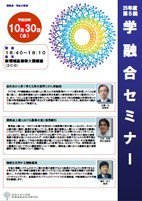AY2013 5th Gakuyugo Seminar
- Date&Time:
- Oct 30, 2013 16:40~18:10
- Venue:
- Large Lecture Room (2C0), New Frontier Science Bldg.

Regenerative medicine and cancer stem cells from the perspective of chromosomes
Associate Professor Hitoshi Sato
In 2012, the Nobel Prize was awarded to Professor Shinya Yamanaka of Kyoto University for his work in the creation of iPS cells. In addition, the hypothesis that cancer originates from a small population of specific cells with the characteristics of stem cells, which are capable of self-renewal and differentiation into various types of cells, is gaining acceptance. This article discusses the current situation from the perspective of chromosomes.

Agricultural Production and Poverty Alleviation in Developing Countries
Project Associate Professor Hirotaka Matsuda
It is estimated that there are about 3 billion poor people living on less than $2 a day in developing countries, and 3/4 of them live in rural areas and depend on agriculture for their livelihood. Not only is the promotion of agriculture and rural areas a top priority for humanity, but it is also becoming clear that agricultural production can make a significant contribution to poverty alleviation. However, it has been pointed out, for example, that although the level of economic development in Sub-Saharan Africa is lower than that of South Asia in terms of income, there are more resources available in Sub-Saharan Africa because women are more actively engaged in agriculture, and as a result, the nutritional status of children is higher. Its role in alleviating poverty varies according to region, culture, and stage of development. The role of agricultural production in poverty alleviation varies depending on the region, culture, and stage of development. In this seminar, we will review research trends and survey research conducted in rural areas of developing countries, and discuss the role of agricultural production in poverty alleviation in developing countries.

Information environment that utilizes the sense of touch
Professor Hiroyuki ShinodaWe will consider how the sense of human skin, i.e., the sense of touch, can be utilized in future information systems. In particular, we will introduce the technology to induce the sense of touch without contact without wearing special devices, and discuss the possibility of using this technology to elucidate brain functions, realize programmable three-dimensional interfaces, virtual reality, alerting people in automobiles and public spaces, and guiding behavior.
*The contents of this page were developed based on a machine translation.

